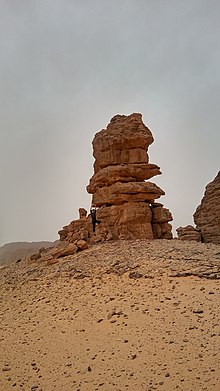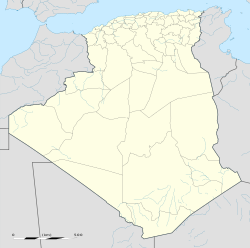Djanet (Arabic: جانت; Berber: ⵊⴰⵏⴻⵜ, Janet) is an oasis city, and capital of Djanet District as well as of Djanet Province, southeast Algeria. It is located 412 km (256 mi) south of Illizi. According to the 2008 census it has a population of 14,655,[1] up from 9,699 in 1998,[2] and an annual population growth rate of 4.3%.[1] It is inhabited by the Kel Ajjer Tuareg people.
Djanet
ﺟﺎﻧﺖ | |
|---|---|
Town and commune | |
 A view of Djanet | |
 Location of Djanet Commune within Djanet Province | |
| Coordinates: 24°33′18″N 9°29′7″E / 24.55500°N 9.48528°E | |
| Country | |
| Province | Djanet |
| District | Djanet (seat) |
| Government | |
| • PMA Seats | 7 |
| Area | |
• Total | 57,460 km2 (22,190 sq mi) |
| Elevation | 1,035 m (3,396 ft) |
| Population (2008) | |
• Total | 14,655 |
| • Density | 0.26/km2 (0.66/sq mi) |
| Time zone | UTC+01 (CET) |
| Postal code | 33100 |
| ONS code | 3302 |

History
editThe region of Djanet has been inhabited since Neolithic times. There were periods of ten thousand years at a time that the area was not desert. The flora and fauna were luxuriant as is seen in the numerous rock paintings of Tassili n'Ajjer around Djanet. Populations of hunter-gatherers lived there.
Djanet was founded in the Middle Ages by the Tuareg. The Ottoman Empire, which had a nominal authority over the Fezzan region, reinforced their presence in the area at the beginning of the 20th century in reaction to the colonization of Africa by the Europeans.
Geography
editDjanet, and the nearby towns of Azelouaz, El Mihan, Adjahil and Eferi, lie in a valley carved by the intermittent river (wadi) Oued Idjeriou through the southwest edge of the Tassili n'Ajjer mountain range and east of the Erg Admer sand dunes. The Tadrart Rouge is located to the southeast and is a southern prolongation of the Libyan Tadrart Acacus.
Due to the somewhat cooler air, higher humidity and somewhat higher rainfall in these areas, the nearby mountains support a greater amount and variety of wildlife than lower-lying areas in the Sahara, and forms part of the West Saharan montane xeric woodlands ecosystem. Djanet itself lies at an altitude of 1,035 metres (3,396 ft), but the mountains to the east and north reach as high as 1,905 metres (6,250 ft).[3]
Climate
editDjanet has a hot desert climate (Köppen climate classification BWh), with very hot summers and mild winters. The city is extremely dry throughout the year, with an annual average rainfall of just 14.6 millimetres (0.57 in) and no month with an average of more than 3 millimetres (0.12 in).
| Climate data for Djanet (1976–2005) | |||||||||||||
|---|---|---|---|---|---|---|---|---|---|---|---|---|---|
| Month | Jan | Feb | Mar | Apr | May | Jun | Jul | Aug | Sep | Oct | Nov | Dec | Year |
| Record high °C (°F) | 31.4 (88.5) |
34.4 (93.9) |
35.4 (95.7) |
41.0 (105.8) |
49.0 (120.2) |
44.0 (111.2) |
48.5 (119.3) |
46.4 (115.5) |
42.0 (107.6) |
39.7 (103.5) |
33.4 (92.1) |
33.4 (92.1) |
49.0 (120.2) |
| Mean daily maximum °C (°F) | 19.3 (66.7) |
21.9 (71.4) |
26.1 (79.0) |
31.9 (89.4) |
35.8 (96.4) |
38.0 (100.4) |
37.6 (99.7) |
37.2 (99.0) |
35.6 (96.1) |
31.1 (88.0) |
25.2 (77.4) |
20.8 (69.4) |
30.0 (86.0) |
| Daily mean °C (°F) | 12.0 (53.6) |
14.5 (58.1) |
19.0 (66.2) |
24.7 (76.5) |
29.0 (84.2) |
31.4 (88.5) |
31.0 (87.8) |
30.6 (87.1) |
28.8 (83.8) |
24.2 (75.6) |
17.9 (64.2) |
13.4 (56.1) |
23.0 (73.4) |
| Mean daily minimum °C (°F) | 4.6 (40.3) |
7.0 (44.6) |
11.8 (53.2) |
17.4 (63.3) |
22.1 (71.8) |
24.7 (76.5) |
24.4 (75.9) |
23.9 (75.0) |
22.0 (71.6) |
17.2 (63.0) |
10.6 (51.1) |
5.9 (42.6) |
16.0 (60.8) |
| Record low °C (°F) | −7.5 (18.5) |
−3.6 (25.5) |
0.8 (33.4) |
6.4 (43.5) |
10.4 (50.7) |
17.0 (62.6) |
18.0 (64.4) |
14.0 (57.2) |
11.0 (51.8) |
5.4 (41.7) |
0.5 (32.9) |
−3.0 (26.6) |
−7.5 (18.5) |
| Average precipitation mm (inches) | 1.0 (0.04) |
1.2 (0.05) |
3.6 (0.14) |
1.0 (0.04) |
2.6 (0.10) |
2.7 (0.11) |
0.2 (0.01) |
0.6 (0.02) |
1.0 (0.04) |
1.8 (0.07) |
0.2 (0.01) |
0.2 (0.01) |
16.1 (0.63) |
| Average precipitation days (≥ 0.1 mm) | 0.4 | 0.5 | 0.6 | 0.5 | 1.8 | 0.8 | 0.0 | 0.4 | 0.7 | 0.7 | 0.3 | 0.3 | 7.0 |
| Average relative humidity (%) | 35.3 | 29.3 | 22.7 | 18.7 | 18.0 | 18.2 | 16.6 | 18.4 | 20.4 | 26.6 | 28.1 | 33.2 | 23.8 |
| Source 1: World Meteorological Organization (average temperatures and precipitation, 1976–2005)[4] | |||||||||||||
| Source 2: climatebase.ru (extremes, humidity)[5] | |||||||||||||
Transport
editDjanet Inedbirene Airport[6] is located about 30 kilometers south of the city center.
Education
edit4.1% of the population has a tertiary education, and another 19.8% has completed secondary education.[7] The overall literacy rate is 85.6%, and is 92.1% among males and 78.0% among females, all three rates being the highest for any commune in the province.[8]
Localities
editThe commune is composed of 12 localities:[9]
- Centre Ville
- Azelouaz
- Tin Katma
- El Mihan
- Aghoum
- Adjahil
- Eferi
- In Abarbar
- Medak
- Arikin
- Tin El Koum
- Anijir
See also
editExternal links
editReferences
edit- ^ a b "Population: Illizi Wilaya" (PDF) (in French). Office National des Statistiques Algérie. Archived (PDF) from the original on 13 November 2011. Retrieved 16 May 2013.
- ^ "Algeria Communes". Statoids. Archived from the original on 18 July 2017. Retrieved 8 March 2013.
- ^ "Sabhah Sheet 8, Edition 4, AMS, 1969". University of Texas Libraries. Archived from the original on 4 October 2012. Retrieved 17 May 2013.
- ^ "World Weather Information Service–Djanet". World Meteorological Organization. Archived from the original on 22 October 2016. Retrieved 21 October 2016.
- ^ "Djanet, Algeria". Climatebase.ru. Archived from the original on 22 June 2013. Retrieved 17 May 2013.
- ^ "Djanet Inedbirene Airport". OurAirports. Archived from the original on 18 August 2014. Retrieved 17 May 2013.
- ^ "Structure relative de la population résidente des ménages ordinaires et collectifs âgée de 6 ans et plus selon le niveau d'instruction et la commune de résidence" (PDF) (in French). Office National des Statistiques Algérie. Archived from the original (PDF) on 13 November 2011. Retrieved 13 February 2013.
- ^ "Taux d'analphabétisme et taux d'alphabétisation de la population âgée de 15 ans et plus, selon le sexe et la commune de résidence " (PDF) (in French). Office National des Statistiques Algérie. Archived from the original (PDF) on 13 November 2011. Retrieved 13 February 2013.
- ^ "Décret n° 84-365, fixant la composition, la consistance et les limites territoriale des communes. Wilaya d'Illizi" (PDF) (in French). Journal officiel de la République Algérienne. 19 December 1984. p. 1554. Archived from the original (PDF) on 2 March 2013. Retrieved 2 March 2013.
